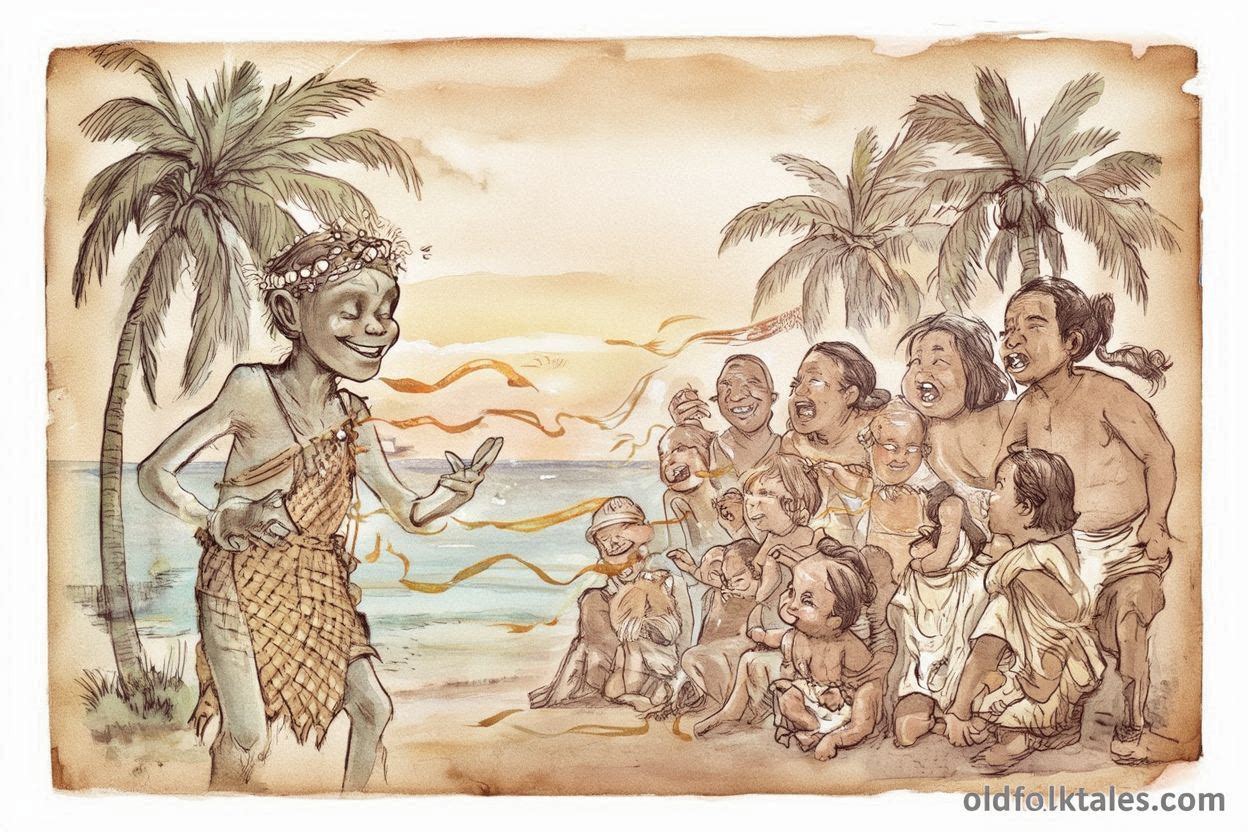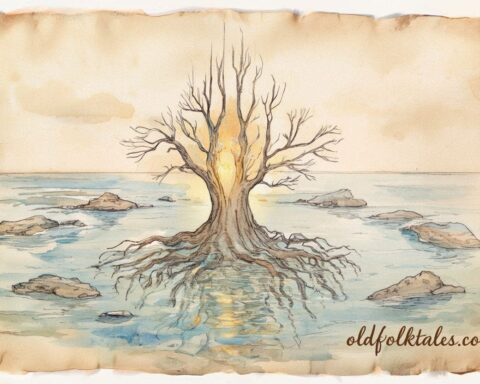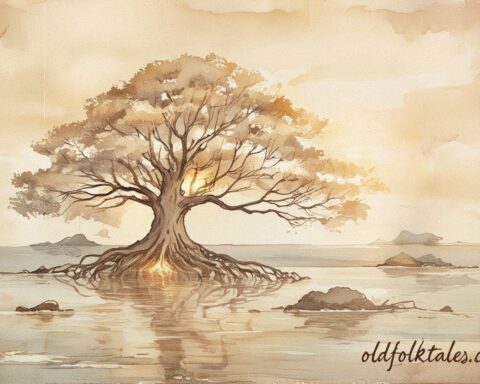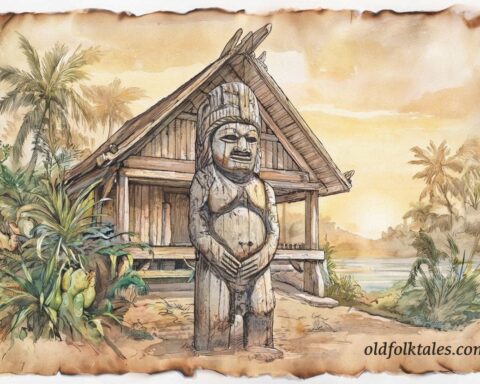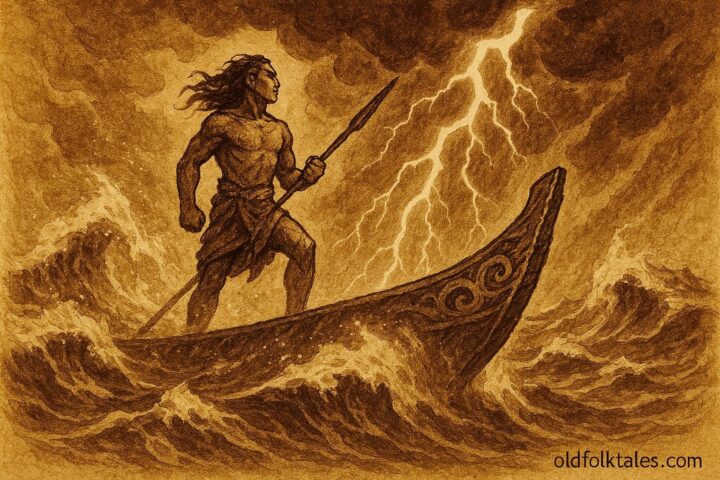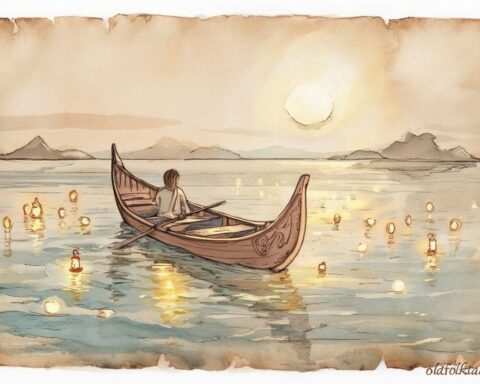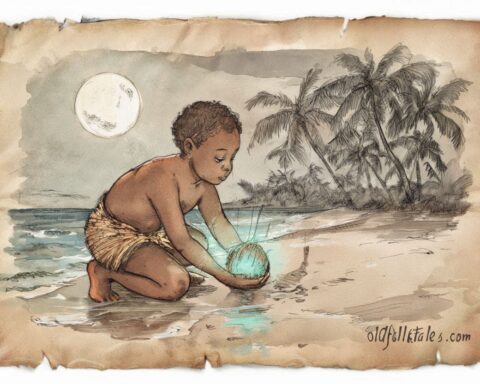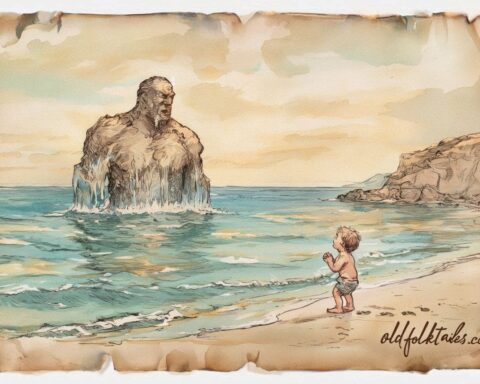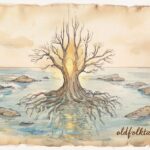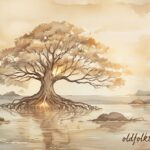In the time when the sky was close enough to touch and the sea whispered the language of the gods, there lived Letao, the most mischievous of all spirits. He was neither fully divine nor entirely human but something in between a trickster who danced between worlds.
Letao loved to test both gods and mortals, for he believed that wisdom grew from laughter and confusion. His laughter echoed through the coconut groves and across the lagoon whenever he found a new scheme to carry out.
One day, Letao looked down from the heavens and saw the people of the Marshall Islands struggling to build canoes. They worked hard, yet their boats always sank or broke apart. Feeling amused, Letao decided to help in his own peculiar way.
He descended to earth in the shape of a young man and visited a village near the shore. “I can build a canoe that will never sink,” he declared proudly. The villagers, weary from failure, looked at him with hope and suspicion. The chief asked, “And what do you want in return?”
Letao grinned. “Only your laughter,” he said, and they agreed.
He began gathering wood, but instead of using dry, strong timber, he picked damp, heavy logs from the mangroves. The villagers warned him, yet he ignored them. When they protested, he said, “Sometimes what looks weak holds the greatest secret.” They obeyed, trusting his strange wisdom.
When the canoe was finished, it looked odd and uneven. Still, Letao pushed it into the lagoon. To everyone’s surprise, it floated perfectly, gliding across the water with grace. The people cheered, and Letao laughed until his sides hurt.
But Letao’s curiosity was endless. He wanted to see how far the canoe could go, so he paddled far beyond the horizon. As the sun set, he reached the edge of the ocean world where the spirits of the deep lived. There, he met Nareau, the great spider god, weaving the threads of destiny between the islands.
“Letao,” Nareau said sternly, “your laughter disturbs the order I weave. What brings you so far from home?”
Letao replied, “I only wish to learn your secret of creation, so I too may weave the fate of men.”
Nareau studied him for a moment and said, “Creation is not for jesters. It is for those who understand balance.”
Letao smiled slyly. “Then teach me balance, and I shall teach the world joy.”
Intrigued, Nareau agreed but warned, “If you use this knowledge for mischief, the sea will turn against you.”
Letao listened carefully as Nareau showed him how the threads of earth, water, and wind were joined to form life. When the lesson ended, Letao thanked him but as he returned to the mortal world, he could not resist another prank.
He twisted some of the threads together in a new pattern, creating strange creature some with shells, others with fins and released them into the ocean. These became the first sea turtles and fish, and though Nareau was angry, he could not undo Letao’s work.
When Letao returned to the islands, he found the people frightened. Storms had come, and the waves were angry. “You have angered the sea,” they said. “You must make peace with it.”
So Letao went to the shore, built a small altar, and spoke to the ocean. “Forgive me,” he said, “for my laughter is wild but my heart is kind. I only wish to bring life and lessons to this world.”
The waves calmed, and the people rejoiced. From that day, they began to honor Letao not only as a trickster but also as a bringer of wisdom hidden within folly.
He continued to roam the islands, playing jokes on chiefs and gods alike. Once, he convinced a greedy chief that he could make him invisible. He covered the man in fine coconut oil and told him to walk proudly through the village. The chief, shining under the sun, believed he was unseen until the laughter of children filled the air. Letao’s mischief exposed vanity and pride wherever he found them.
Over time, the people began to tell his stories in their meeting houses and across the atolls. They said that whenever someone laughed too loudly or acted too proudly, Letao was near, teaching another lesson through humor.
Though many spirits faded into myth, Letao’s presence remained strong. His stories became part of every generation’s teaching, reminding the Marshallese that laughter could be sacred, that cleverness was a gift, and that wisdom often hid behind foolish acts.
Even now, when islanders build canoes or tell jokes during gatherings, they say Letao listens from the waves, smiling and whispering, “Never forget to laugh, for laughter itself is divine.”
Moral Lesson:
The story of Letao teaches that humor can hold deep wisdom. Even through mischief, the trickster reminds humanity that balance, humility, and laughter are powerful forces for learning and growth.
Knowledge Check
1. Who is Letao in Marshallese mythology?
Answer: A trickster demigod who uses cleverness to teach lessons.
2. What did Letao build for the villagers?
Answer: A canoe that floated perfectly despite being made from odd wood.
3. Who did Letao meet at the edge of the ocean world?
Answer: Nareau, the spider god.
4. What creatures did Letao accidentally create?
Answer: Sea turtles and fish.
5. How did Letao make peace with the sea?
Answer: By building an altar and asking forgiveness.
6. What moral does Letao’s story teach?
Answer: Wisdom can be found through humor and humility.
Source: Adapted from Legends of Letao and Other Marshallese Tales by the University of the South Pacific 2010
Cultural Origin: Marshall Islands Micronesia
